This is Kathleen’s story as told by her. Our “Opening Our Hearts” stories are based on people’s real-life experiences. By sharing these experiences publicly, we hope to help our readers feel less alone in their grief and, ultimately, to aid them in their healing process. In this story, Kathleen talks about how her parents’ dysfunctional relationship led her mother to dull her physical and emotional pain with alcohol — a choice that eventually led to her death.
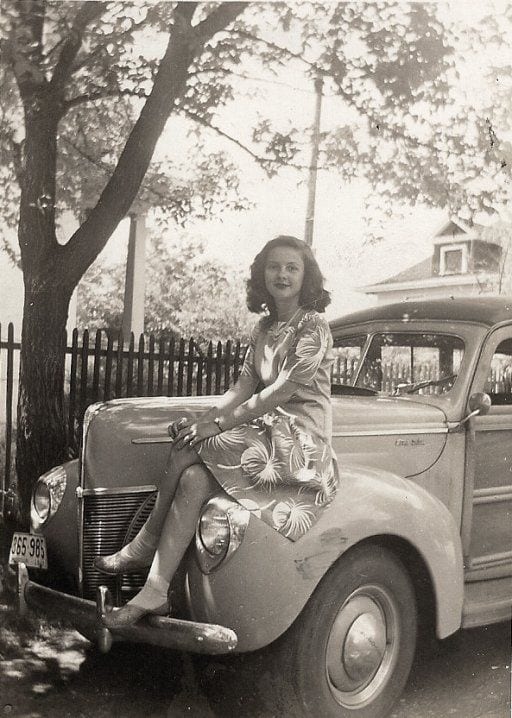
My mom was a beautiful young woman who was sadly unprepared for the challenges of married life.
Credit: Jim Lee
My mom died at the age of 61 from complications of cirrhosis of the liver caused by years of alcohol abuse. She had been sick for a long time, but true to her Irish Catholic roots, she kept the extent of her illness to herself. Irish women don’t complain, you see. Even when life is intolerable, they silently endure whatever comes their way. That personality trait — carried from generation to generation like a defective gene — was probably the number one reason my mom turned to alcohol to ease her pain.
My mother married my dad shortly after the end of World War II. Like thousands of young people at the time, she was swept up in the celebratory post-war atmosphere and the promise of the G.I. bill, which gave every veteran a head start at a decent life. And it didn’t hurt that my dad was handsome and charming and intent on sweeping the young, dark-haired beauty off her feet. (Mom told me years later that he told her he was going to marry her the day they met.)
But she was also a good student and very smart — the only one of the girls in the family to attend college.
Neither my mom nor her new husband was prepared for marriage — Mom least of all. She was the youngest child in a large, extended family, with two older sisters, a brother, and a ragtag group of cousins whom my grandparents took in when the Depression left their families too poor to care for them. She told me more than once as I was growing up that her older siblings took care of all the household chores while she spent her free time daydreaming as she gazed at herself in the mirror and brushed her hair. But she was also a good student and very smart — the only one of the girls in the family to attend college. But then, to my grandma’s dismay, she dropped out after two years to marry my dad.
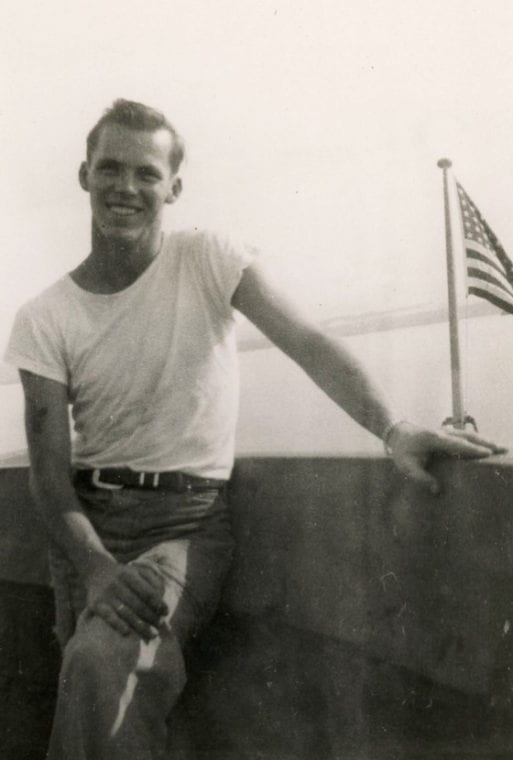
My dad was a handsome sailor when he met my mom and fell instantly “in love.”
Unprepared though they were for the responsibilities of marriage, my parents were happy in those early years. They had very little money, especially after the kids came along — first my brother Jim, then me three years later, then my sister, Mary, three years after that. My dad was a salesman and traveled a lot, so most of the child-rearing was left to Mom. I think things were hard for her even then. She wasn’t used to handling responsibility, and suddenly she had three kids to take care of and a household to run. But when Dad was home she seemed happy enough. On Friday nights, they would buy a quart of beer to split, and we kids would have root beer floats.
I’m not sure when Mom’s drinking became a problem, but I think she started drinking a lot when my dad took a job with a textile company in North Carolina when I was about 10. We lived in a “mill town” where the company owned the homes and rented them to their employees dirt cheap. My dad held a prestigious job, so we had one of the largest homes, a big yard, and — believe it or not — a maid. But when I look back on it now, I think my mom was lonely. My dad still traveled all the time, and all of her family and friends were back in New York. Plus, the locals weren’t exactly welcoming to the “Yankees” who had just moved in. (It didn’t help that we were the only Catholics in a Southern Baptist town.) I know I felt isolated and ostracized, and I’m sure she did too.
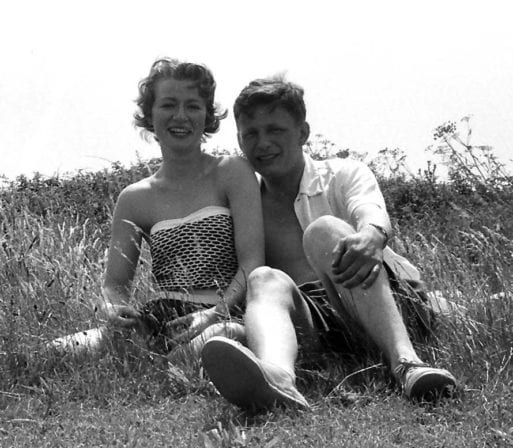
My parents seemed happy early on before alcohol destroyed their marriage and their lives.
I don’t recall ever seeing my mom drink back then. In fact, I rarely saw my mom drink at all until many years later, when our family had already fallen apart. The big drinker was my dad. A successful businessman with a fat expense account, he was a dedicated devotee of two-martini lunches and three-martini happy hours, and on the weekends he pretty much drank beer all day. I know my mom joined in when they went out for dinner or to a cocktail party, but I never noticed her drinking much at home. Looking back on it now, I’m sure she did.
I was just 12 at the time and really didn’t have a clue what was going on behind the scenes.
Things started to go really bad for my parents (and all of us) when my dad lost his job at the textile company, and we moved to Illinois so he could take a new job. I was just 12 at the time and really didn’t have a clue what was going on behind the scenes. But I learned later that Mom, who managed the family finances, had been lying to my dad about how much debt they were in, and my dad was having an affair with his new boss’s wife. Needless to say, that didn’t end well. Dad wound up getting fired, and Mom had to confess to him that they were broke. We were evicted from the rented house we were living in, and my mom and the four kids (my younger brother came along when I was 8) moved into a tiny bungalow in the Poconos that my aunt and uncle owned. It had no running water and no heat. But it was summer, and the property was huge, so for us kids it was great. I doubt my mom felt the same.

After we were evicted from our home in Illinois, mom took all four kids to live in a tiny cabin in the Poconos with no running water or heat.
Credit: oldhousesunder50k.com
Meanwhile, my dad stayed with his brother on Long Island while he looked for work.
From that time on, my family devolved rapidly. Dad eventually landed a job in Manhattan, and we moved out of the bungalow to a rented house on Long Island. But by then, his drinking was completely out of control, and the job didn’t last long. After he got fired, he would go into Manhattan every day, supposedly looking for work. But he spent most of his time with his buddies at the bar. He would come home most nights very late, and very drunk. Many of those nights ended with him beating the crap out of my mom. She would spend the next day — sometimes several days — in her bedroom so we wouldn’t see the bruises (as if we didn’t know exactly what had happened the night before).
I’ll never understand why my mother stayed with my father. She could have asked anyone in the family for help, and they would gladly have taken us in. But she had that stupid, Irish stubborn streak. My sister and I begged her to leave, but she wouldn’t budge.
She would refill the glass in secret, so it looked like she wasn’t drinking very much at all.
What she did instead was self-medicate with alcohol, sipping Scotch that she drank from a little jelly jar as she waited for my dad to come home. She would refill the glass in secret, so it looked like she wasn’t drinking very much at all. But sooner or later she would start slurring her words, and it would be clear that she was drunk. Not that I took much notice. At that point, I was living in survival mode, just trying to hold on. I guess she was doing the same thing.
Things continued that way for a very long time. In fact, they got worse. Calls to 911 by either my sister or me were commonplace, as were my mom’s denials to the police officers who responded that anything was wrong. (This was long before OJ — without a complaining witness, they couldn’t touch my dad.) I was furious with both of them — Dad for being a drunk and a wife-beater and Mom for refusing to send him to jail. I still lived with them; I couldn’t afford a place of my own. But I began spending more and more time at my boyfriend’s parents’ house where it was quiet and safe.
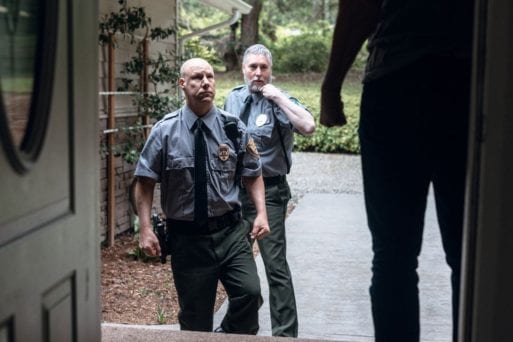
The police were at our home on a regular basis, but my dad was never arrested because Mom wouldn’t make a complaint.
Credit: UCLA.edu Newsroom
Then, when I was about 19, the beatings just stopped. (I learned later that my younger brother, by now a big, strong 12-year-old, told my father he would kill him if he ever touched my mom again.) I had just been accepted to nursing school after working for a couple of years at a bank, and again started spending more time at home. Both of my parents continued drinking heavily, but there were no more beatings. I figured that was as good as it was going to get.
Eventually I graduated from nursing school, got a job, got married, and — not long after that — got divorced. I saw my parents rarely, but when I did see them it was clear that my mom wasn’t well. Her color was horrible, and her belly was huge. I begged her to see a doctor, and eventually she agreed. She went alone, probably because she knew what the doctors would say, and she didn’t want to share the news. But when I asked her about it later, she told me the truth: She had cirrhosis, and if she didn’t stop drinking immediately, she would die.
I knew she was lying, and she knew that I knew. It was a game we’d been playing for a very long time.
To be honest, I’m surprised my mom told me that much. She was so practiced at denial and subterfuge that admitting her diagnosis was a big leap for her. Maybe she figured I was a nurse and would be able to guess what was going on. Or maybe she was just too sick and tired to deny it anymore. In any event, she swore to me that she would stop drinking. But I knew she was lying, and she knew that I knew. It was a game we’d been playing for a very long time.
About three months after my mom’s “official” diagnosis, I was working the 11 a.m. to 7 p.m. shift at the hospital and I got a call from my sister. She was at my parents’ house, and my mom was sick. She couldn’t stand up on her own and was having trouble breathing. I told my sister to call 911 and tell the EMTs to take my mom to Stanford, where I worked.
I met my family outside the ER. It was a rainy March night, and they were all just sitting there in the dark — my dad, my sister, and my younger brother Mike. (My older brother lived in the Midwest.) I asked them if anyone had seen my mom or spoken to a doctor, and they all shook their heads “No.” So I steeled myself and went inside.
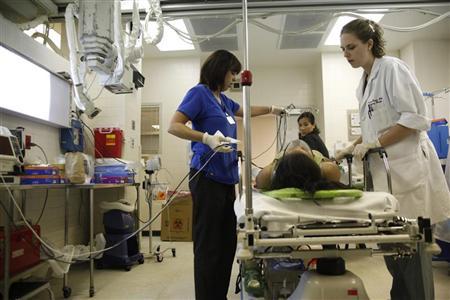
When I finally spoke to the doctor caring for my mom, I knew she was not going to survive.
Credit: Jessica Rinaldi/reuters.com
My mother looked ghastly. She had an oxygen mask on, and her lips and fingertips were blue, her skin a deathly white. She was struggling to breathe, but — true to form — told me not to worry, that everything would be alright. I looked around for a doctor, and my eyes settled on a young intern nearby.
“How is she?” I asked.
“She has pneumonia and her blood pressure is very low,” the doctor said. “We’re not sure what’s going on.”
“Has anyone told you she’s an alcoholic?” I said.
“No!” the doctor replied. And in the next breath she said “Oh my God, I know her! I took care of her at the Valley.” (This was a reference to Santa Clara Valley Medical Center, where Stanford doctors trained). “She’s such a sweet lady!”
I knew then that she had no chance of surviving the infection, and I went outside to talk to my family and prepare them for the worst.
She then went on to tell me that the doctors at the Valley had failed to give my mom a pneumonia vaccine when she was treated there because her clotting factors (which are made by the liver) were too low for a shot. Bacterial pneumonia is deadly for people with advanced liver disease, and it was pretty clear at that point that was what she had. Given her low blood pressure and overall condition, it appeared that the bacteria was also in her blood, and she was in septic shock. I knew then that she had no chance of surviving the infection, and I went outside to talk to my family and prepare them for the worst.
They transferred my mom to the ICU pretty quickly after that. She had no advance directive, so she was intubated and put on a ventilator, but I knew she was going to die no matter what the doctors did. Sitting outside in the waiting room, I told my family that they needed to go see her and say good-bye. But not one of them would go into her room. “I don’t want to see her like that,” they all said — even my dad. He’d been married to the woman for over four decades, and he refused to go to her on her deathbed. It was more than I could bear.
I said goodbye to my mom alone. She was bleeding everywhere — there was bright red blood in her endotracheal tube when the nurse suctioned her, and there was blood draining from the tube in her stomach. The nurse was pushing platelets through one IV while four different blood pressure medicines ran through another in a last-ditch effort to keep her alive. But nothing was working. I could see she was going downhill fast.
The nurse asked me if I wanted him to lower Mom’s sedation so she would know I was there. I said yes, and a moment or two later she opened her eyes. She looked terrified and helpless, and so very, very sad. All I could do was tell her I loved her, hold her hand, and cry.
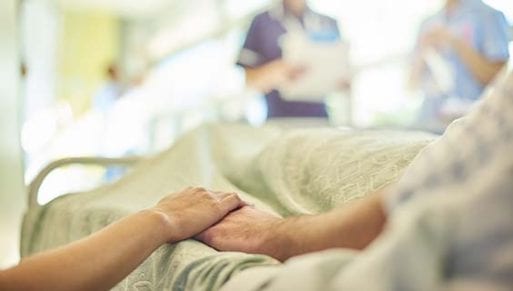
Sitting next to my mom’s bed alone in the ICU was one of the worst experiences of my life.
Credit: NIA.org
My mom died a few hours later. She never saw the man she had married 40 years before — the man she had refused to leave despite all the pain he caused her — again. I’ll never know how that made her feel, but to me, that was the defining tragedy of her sad, tragic life.
It’s been almost 40 years since my mom died. To be honest, I don’t think about her much anymore. I have long since accepted the fact that she made her own choices and I was as helpless to help her as she was to help herself. But it still hurts to remember her, and to wonder what her life would have been like if she’d left my dad. My aunts told me, before they died, too, that she was beautiful and smart and funny, and she probably was. But that person was gone long before I had a chance to know her. The woman I knew was a shadow — a wraith — so practiced at hiding that she was practically invisible.
I wish I could remember her some other way. But the shadow is all I can see.

 My Mom Died of Alcoholism, Denial and Despair
My Mom Died of Alcoholism, Denial and Despair


 First the Wealth Gap, Now the U.S. Has a Growing Health Gap
First the Wealth Gap, Now the U.S. Has a Growing Health Gap
 How to Comfort A Dying Loved One
How to Comfort A Dying Loved One
 Our Annual Seven Holiday Gifts for Someone Who Is Grieving, 2024 Edition
Our Annual Seven Holiday Gifts for Someone Who Is Grieving, 2024 Edition














